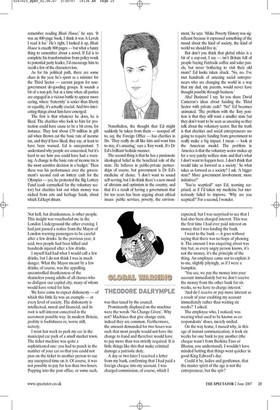GLOBAL WARNING
Not hell, but drunkenness, is other people. This insight was vouchsafed me in the London Underground the other evening. I had just passed a notice from the Mayor of London warning passengers to be careful after a few drinks. In the previous year, it said, two people had been killed and hundreds injured after a few drinks.
I myself had had what I would call a few drinks, but I do not think I was in much danger. What the Mayor meant by a few drinks, of course, was the appalling uncontrolled drunkenness of the shameless young adults of all classes who so disfigure our capital city, many of whom would have voted for him We have come to expect dishonesty — of which this little lie was an example — at every level of society. The dishonesty is intellectual, moral and financial, and its root is self-interest conceived in the narrowest possible way. In modern Britain, probity is foolishness or, worse still, naivety.
I went last week to park my car in the municipal car park of a small market town. The ticket machine was quite a sophisticated one: you had to punch in the number of your car so that you could not pass on the ticket to another person to use any unexpired time on it. Of course, it was not possible to pay for less than two hours. Popping into the post office, or some such, was thus taxed by the council.
Prominently displayed on the machine were the words 'No Change Given'. Why not? Machines that give change exist, indeed they are common. Furthermore, the amount demanded for two hours was such that most people would not have the change to hand and therefore would have to pay more than was strictly required. It is little things like this that make criminal damage a patriotic duty.
A day or two later I received a letter from my bank, confirming that I had paid a foreign cheque into my account. I was charged commission, of course, which I expected; but I was surprised to see that I had also been charged interest. This was the first time I had ever paid interest on money that I was lending the bank.
I went to the bank — it goes without saying that there was no hope of phoning it. The amount I was enquiring about was tiny but, as every angry person knows, it's not the money, it's the principle of the thing. An employee came out to explain it to me, slightly pityingly, as if I were a bumpkin.
'You see, we pay the money into your account immediately but we don't receive the money from the other bank for six weeks, so we have to charge interest.'
'And do I receive or pay more interest as a result of your crediting my account immediately rather than waiting six weeks?' I asked.
The employee who, I noticed, was wearing what used to be known as corespondents' shoes, merely smiled.
On the way home, I mused why, in this age of instant communication, it took six weeks for one bank to pay another (the cheque wasn't from Burkina Faso or Bhutan, you understand). I wouldn't have minded betting that things went quicker in good King Edward's day.
Could it be, ladies and gentlemen, that the master spirit of the age is not the entrepreneur, but the spiv?




















































 Previous page
Previous page